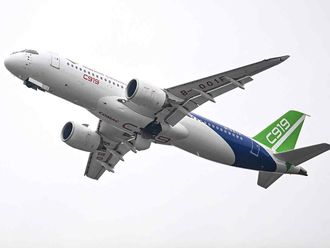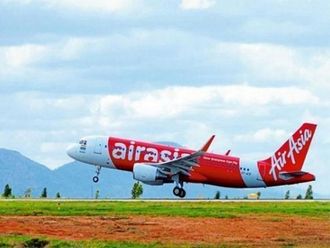Dubai
The Emirates alliance has been “absolutely fantastic”, Qantas chief executive Alan Joyce said on Thursday as he reported the airline’s biggest loss as a public company.
Qantas Group declared a before tax loss of 642 million Australian dollars (Dh2.2 billion) and a statutory after tax loss, which includes aircraft write downs, of A$2.8 billion for the 12 months ending June 30. A year ago it declared a A$1 million dollar profit.
“There is no doubt that today’s numbers are confronting,” Joyce told a press conference in Sydney.
Despite the record loss, Qantas share price closed on Thursday up 6.95 per cent at A$1.385 on the Australian Securities Exchange.
Capacity saturated domestic and international markets along with record fuel prices were blamed for the historical loss. But the airline’s international division, which will now be spun off under a separate holding company as part of a strategy to encourage foreign investment into the Group, dragged the company down.
The international division had a before interest and tax loss of A$497 million, compared with a A$246 million loss a year earlier. This is Qantas’ first full financial year, which runs from July 1 to June 30, of its revenue sharing partnership with Emirates.
Joyce talked up the Emirates partnership that he said has provided the airline with “better connections in Europe and North Africa.”
“We have seen significant travel levels going over Dubai … the customer ratings going over the Dubai hub is the best in our network,” he said.
But on Thursday, Nick Xenophone, an Australian Independent Senator, citing government figures, wrote in the Australia’s The Age that “in the 12 months since April 1, 2013, compared to the previous year, Qantas has gained only 2 per cent of passengers entering Australia; Emirates’ passenger numbers have jumped 18 per cent.”
Tony Webber, former chief economist at Qantas, said by phone that Emirates may be sucking customers away from Qantas, rather than helping its troubled alliance partner.
“People who once flew on Qantas operated aircraft who suddenly fly on the Emirates operated aircraft are seeing a big improvement in quality. Instead of booking on the Qantas website they are now just jumping on the Emirates website,” he said.
Former Australian Prime Minister Malcolm Fraser tweeted on Thursday that, “Joyce has many questions to answer. Board made foolish decisions, being eaten by Emirates.”
Joyce insisted that “the worst is over” and announced that the Group will not be selling off its profitable loyalty programme, which has been the centre of much speculation, and that he has targeted a half year profit for the six months ending December 31, 2014. However, he refused to discuss the new structure of Qantas International.
Qantas competitor Virgin Australia has separated its domestic and international divisions in such a way that allows the airline to be backed by Etihad Airways, Air New Zealand and Singapore Airlines. Qantas has previously lashed out at the “unfair” foreign state backing of Virgin. Emirates has consistently said it’s not interested in buying a stake in Qantas.
Webber said foreign investment will not make up for the international capacity saturation haunting Qantas. He said that airline needs to establish more codeshare partners to drive revenue into the international division.
“It (Qantas) can’t match these airlines with costs and it never will. As soon as you have Australian labour cost base there is no way you can compete with the Gulf carriers and the Asian carriers,” he said.
Qantas domestic reported a before interest and tax profit of A$30 million, down from a A$365 million profit a year earlier. Jetstar, the Groups low cost carrier, reported a before interest and tax loss of A$116 million, down from a A$138 million profit last year.











